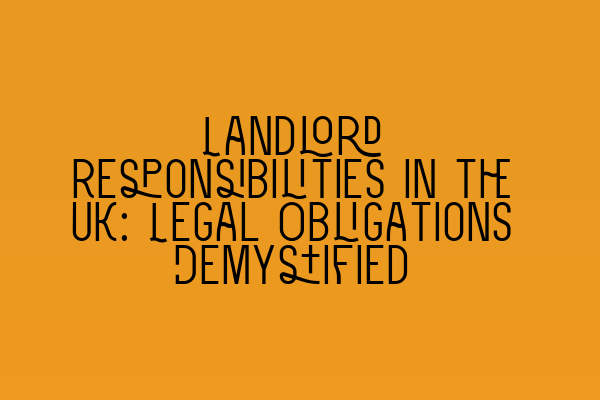As a landlord in the UK, it is crucial to understand your legal responsibilities and obligations when it comes to renting out your property. By familiarizing yourself with the landlord responsibilities, you can ensure that you comply with the law, provide a safe and comfortable living environment for your tenants, and avoid potential legal disputes.
In this article, we will demystify the legal obligations of landlords in the UK, providing you with a comprehensive guide to help you navigate the complex world of property law.
Health and Safety Responsibilities
One of the primary responsibilities of a landlord is to provide a safe and habitable property for tenants. This involves complying with various health and safety regulations, including:
- Gas Safety: Landlords are legally required to have all gas appliances and flues in the property checked annually by a Gas Safe registered engineer. A Gas Safety Certificate must be provided to tenants.
- Electrical Safety: Landlords must ensure that the electrical system and any electrical appliances provided are safe for use. Regular inspections by a qualified electrician are recommended.
- Fire Safety: Landlords must ensure that the property is equipped with appropriate fire safety measures, including smoke alarms and carbon monoxide detectors. Regular testing and maintenance of these devices are essential.
- Furnishings and Appliances: Any furnishings or appliances provided by the landlord must meet safety standards and display appropriate labels.
By fulfilling these health and safety responsibilities, you can protect the well-being of your tenants and avoid potential legal liabilities.
Tenant-Discrimination Responsibilities
As a landlord, it is essential to understand and comply with anti-discrimination laws when selecting tenants. You cannot discriminate against potential tenants based on their race, religion, gender, disability, sexual orientation, or other protected characteristics.
It is important to treat all potential tenants fairly and equally during the screening process, ensuring that your selection is based on objective criteria such as income, rental history, and references.
Repair and Maintenance Responsibilities
Landlords have a legal duty to maintain the property and keep it in good repair. This includes:
- Structural Integrity: The structure of the property, including the roof, walls, and floors, must be properly maintained and free from hazards.
- Water and Gas Supply: The water and gas supply must be in good working order, with no leaks or faults.
- Heating and Ventilation: The heating system must be adequately maintained, and ventilation must be provided to prevent dampness and mold.
- Common Areas: If the property has shared spaces, such as stairways or communal gardens, you are responsible for their upkeep.
If any repairs are needed, it is your responsibility to address them promptly. Failure to do so can lead to complaints from tenants, potential legal action, and even financial penalties.
Tenancy Agreement Responsibilities
A tenancy agreement is a legally binding contract between a landlord and a tenant. As a landlord, you have various responsibilities when it comes to the tenancy agreement:
- Providing a Written Agreement: A written tenancy agreement, outlining the terms and conditions of the tenancy, must be provided to the tenant.
- Protecting the Tenant’s Deposit: If you request a deposit from the tenant, it must be protected in a government-approved deposit protection scheme.
- Ensuring Proper Notice: If you wish to end the tenancy or make any changes to the terms, you must provide the tenant with proper notice in accordance with the law.
It is important to create a comprehensive and legally compliant tenancy agreement that protects both you and your tenant. Seeking legal advice or using a professional tenancy agreement service can help ensure that your agreement meets all legal requirements.
For more information on parties’ rights and responsibilities in a contract, you can refer to our related article: Parties in a Contract: Rights and Responsibilities
Understanding the concepts of duress and undue influence in contracts is also essential, take a look at our related article: Unveiling Duress and Undue Influence in Contracts
Consideration is the backbone of any contract, if you want to delve deeper into this topic, refer to our related article: Essentials of Consideration: Understanding the Backbone of Contracts
Decoding the components of an agreement is crucial, here’s our related article on express and implied terms in contracts: Express and Implied Terms in Contracts: Decoding Agreement Components
If you want to know more about breach of contract and the remedies available, don’t miss our related article: Breach of Contract: Remedies for Contractual Violations
Final Thoughts
Being a responsible landlord goes beyond collecting rent and maintaining the property. Understanding and fulfilling your legal obligations is essential for a smooth and successful tenancy.
By prioritizing health and safety, treating tenants fairly, maintaining the property, and complying with tenancy agreement requirements, you can build a positive reputation as a trustworthy and reliable landlord. Remember to stay informed about any changes in the law and seek legal advice when needed.
For more information on property law and landlord responsibilities, feel free to explore our website or reach out to our team at SQE Property Law & Land Law.
